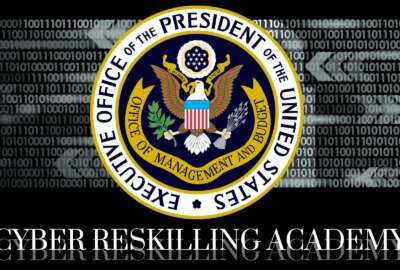
As cyber reskilling academy takes shape, hiring reform wish-list emerges
Attracting in-demand cybersecurity talent to government service could be as simple as retraining current federal employees for the jobs of the future.
Attracting in-demand cybersecurity talent to government service could be as simple as retraining current federal employees for jobs of the future.
That’s the goal of the Federal Cyber Reskilling Academy, which will begin classes with its first cohort of 25 students on April 15, Jason Gray, chief information officer at the Education Department, said Thursday.
Out of more than 1,500 applicants, about a third of applicants did “exceptionally well” on an IT skills assessment, Gray said at an AFFIRM cybersecurity conference in Arlington, Virginia.
Related Stories

Federal Cyber Reskilling Academy to retrain federal employees as cyber defense analysts
Stakeholders behind the academy include the Office of Management and Budget, the Education Department and the CIO Council’s workforce committee, which Gray co-chairs, along with National Science Foundation CIO Dorothy Aronson.
The first cohort of the academy will focus on reskilling federal employees who are not currently working in IT positions. Upon graduation from the program, students will fill new cyber defense analyst positions either at their original agencies or elsewhere in government.
“In many cases, employees probably will just get the education and bring it back to their organization and help further the cyber efforts as it relates to their [agency], so it’s really a win-win, because you’re investing in the employee, regardless of whether or not they transition out of the work that they’re in right now,” Gray said.
Finalists for the academy include a Department of Veterans Affairs employee working in claims processing and an employee elsewhere in government who works in explosive ordnance disposal, but whose position is on the verge of being replaced by advanced robotics.
Stacy Dawn, the chief information security officer for the Export-Import Bank, said the reskilling pilot, if successful, stands out as a key incentive for feds just beginning their careers or private-sector workers considering joining the government.
“If you go into industry into a position and they don’t need your skills anymore, you get a pink slip and you’re on the street,” Dawn said. “The federal government looks to retrain you, and so you have a career for your life, if you want it.”
While some agencies, including the IRS and Customs and Border Protection, have looked for more flexible pay authority to attract in-demand cyber recruits, Dawn acknowledged that the government still lags behind the levels of pay the private sector can offer.
However, she added that having “job security in the long-run,” as well as health care and retirement benefits, can play a key role in government attracting cyber talent.
Tiina Rodrigue, CISO at the Consumer Financial Protection Bureau, said her offers “pay bands” beyond what the General Schedule pay scale outlines, which gives her more flexibility to recruit new employees.
“We prioritize people who have more of a commercial-style mindset who are nimble, agile, driven, and really self-motivated,” Rodrigue said. “But in the end, if you’re not there for the mission, and if you’re just there for the position, you’re not going to succeed.”
Beyond the pay factor, several panelists called for reducing the lengthy time-to-hire process in the government, and also urged the Office of Personnel Management to overhaul USAJobs.gov and make it easier for job-seekers to navigate the website.
“More work needs to be done in terms of modernizing the actual process,” Gray said.
“You better not be applying for a government job if you need a job, because it will take a long time,” Rodrigue added.
Meanwhile, the Energy Department is looking to build a pipeline for future STEM talent.
Last December, the agency ran its CyberForce competition, which had students from more than 60 colleges and universities defend servers and virtual machines from cyber attacks launched by a “red team” of private industry experts.
“We want to get young college kids interested in cybersecurity,” said Adrienne Lotto, deputy assistant secretary for infrastructure security and energy restoration. “We want them to understand that there’s a need in the sector. And for some of them, we want them to even be aware that this field exists.”
Going forward, Energy has looked to accelerate the competition’s workforce development goals by providing more networking and mentorship opportunities from DeE’s national labs, and even include top federal cybersecurity experts in the competition.
“We’re actually working with our partners at OMB to see if there’s a mechanism — we believe there’s a mechanism — by which we can hire some of the students who win the competition into the federal government,” Lotto said, adding that agency leadership had plans to discuss this with OMB later that day.
DoE did not immediately respond to requests on Friday to clarify what that new hiring authority would entail. OMB referred to DoE for comment.
Copyright © 2024 Federal News Network. All rights reserved. This website is not intended for users located within the European Economic Area.
Jory Heckman is a reporter at Federal News Network covering U.S. Postal Service, IRS, big data and technology issues.
Follow @jheckmanWFED




